#eleanor butler
Text
me and who
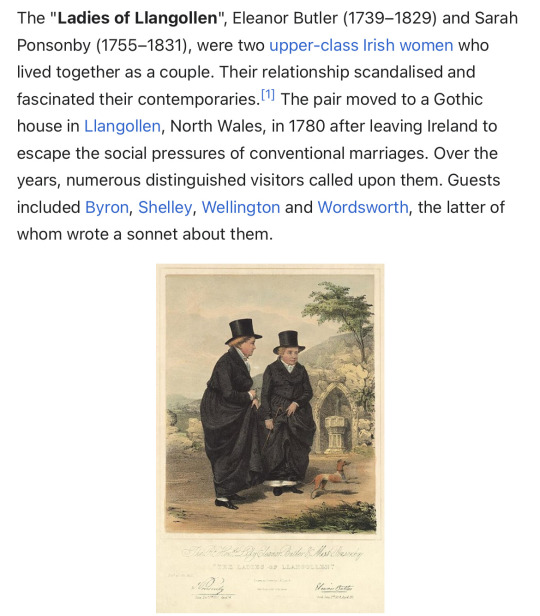
#ladies of llangollen#eleanor butler#sarah ponsonby#goth girls#irish history#lgbt#lgbtq#meme#gothic#sapphic#memes#history#percy shelley#lord byron#william wordsworth#duke of wellington#lesbian#lesbian history#wlw#goth lesbian#queer#goth#goths#goth girl#goth gays
259 notes
·
View notes
Note
Hi, I've only recently gotten interested in the Wars of the Roses and since I am unable to find an unbiased analysis, I wanted to ask: what do you think of Eleanor Talbot and the idea that she was allegedly married to Edward IV?
The more I research the claim, the more incredulous I get that it's often taken so seriously, particularly by Ricardian circles. I'm very skeptical about the fact that this supposed marriage was kept secret for ... 19 years? Even more? Logically, it is not possible for a piece of information that explosive and nationally relevant to stay under lock and key for that long, especially considering Edward's political enemies. I've read some pieces on Eleanor and the most any of them can do is theorize that she may have been romantically involved with Edward at some point before May 1464. But a potential affair hardly means marriage; as far as I can tell, Edward IV appears to have had affairs with lots of women, but Elizabeth Woodville was clearly the one he wanted as his wife and queen, and obviously the only one who was acknowledged and honored as such. From what I can make out, I don't think he would have had that much difficulty getting out of the marriage if he particularly wanted to: considering it was very private, his public acknowledgement of it was crucial, and his word would have triumphed whatever Elizabeth or her family would say; people gathering at Reading to find a way to end it or persuade him to end it did not amount to anything; Wake's witchcraft allegations against Jacquetta directly relating to their marriage which were cleared by Edward's council; even the fact that Elizabeth Woodville did not produce a son until 7 years after she became queen. He very clearly wanted to remain married to her even though he did have potential routes out of it. I've also observed that people tend to link the circumstances of his marriage to Elizabeth and alleged marriage to Eleanor and call it a pattern of behavior, without considering the fact that once again, being involved with someone doesn't automatically mean marriage, and that it's very possibly a deliberately constructed pattern/parallel by the people making the allegations.
And it seems awfully, almost embarrassingly convenient that this came up after both parties were dead, when Richard was actively slandering his brother's licentousness, and when he wanted to usurp the throne from his 12 year old nephew when neither he (Edward V) nor his mother (Elizabeth Woodville) were in a position to assert themselves.
Of course, we'll never truly know for sure but ... what do you think?
Hi! To get straight to the point, there is simply no evidence that Edward IV had been married to anyone other than Elizabeth Woodville. You'd think ricardians would be more careful about this claim since they make such a big deal out of the lack of material proof linking Richard to the murder of the princes (actually king and prince) in the Tower, but no. Lack of evidence doesn't work both ways in this case, apparently.
As many historians have pointed out, parliament, which ultimately ruled that Edward IV had committed bigamy and invalidated his marriage with Elizabeth Woodville, simply did that on the grounds that it was ‘the common opinion of the people and the public voice and fame is throughout the land’. Although parliament could legislate over the succession of the crown, it had no jurisdiction to invalidate anyone's marriage, since only the Church had authority over those matters at that time. If there were any proof that Edward IV had really been married to Eleanor Talbot/Butler, Richard and his supporters would have called an ecclesiastical court made exclusively of prelates and representatives of the pope to rule over that case based on canon law, as that was the Church's prerogative since the 12th century. A. J. Pollard made a very apt observation about this:
Had Richard lll been the deeply troubled, honourable and honest man we are asked to believe him to be he would surely have followed the course of a properly constituted investigation.
Ruth Mazo Karras has a great book called Unmarriages: Women, Men and Sexual Unions in the Middle Ages where she presents many cases of marriages judged by the church to have been clandestine or invalid and actually explains how the Church came to have a monopoly on the legislation of marriages. Jennifer Ward cites an example of an illegal marriage claim taken to the Pope and casts light on how the investigation of an ecclesiastical court should have proceeded in face of the pre-contract allegations made by Richard and his supporters:
This issue of legitimacy and therefore of inheritance was at the heart of the best-known twelfth-century case, concerning Richard de Anesty, dating from 1158-63. Richard claimed to be the heir of his uncle, William de Sackville, on the grounds that William's only child, Mabel de Francheville, was illegitimate. If Mabel had been legitimate, she would probably have inherited her father's land. Richard alleged that William had broken his marriage contract with Albereda de Tresgoz and married Mabel's mother, Adelicia, daughter of Amfrid the sheriff. William and Albereda were said to have expressed present consent, and, according to Richard's account, Albereda asserted that she was William's lawful wife at his wedding to Adelicia, but failed to be heard because of the crowd and because William turned a deaf ear. She was later granted a decree by the bishop of Winchester and Pope Innocent II that William should return to her as her husband. Mabel argued, however, that the marriage contract with Albereda only amounted to betrothal, and that both Albereda and William had agreed to end it; the relationship had never been consummated and William had returned Albereda's dowry. William and Adelicia's marriage had been carried out in the face of the church, and Albereda's father had been present at the wedding feast. The annulment of the marriage by the bishop was null and void. For Alexander III the annulment was the crucial issue, and Mabel was adjudged illegitimate.
We can make a few observations about this case. First, notice how William's alleged first wife, Albereda, sought the Bishop of Winchester then the Pope himself to protest against William's second marriage and have it annulled. Why wouldn't Eleanor Talbot, the daughter of the Earl Shrewsbury and NIECE of the Earl of Warwick, who had such influence over Edward IV's early reign, be silent about Edward IV's second marriage? It's not like she was a helpless nobody who wouldn't have anyone to vouch for her case in the papal court. Moreover, according to a Burgundian report about the revelation of Edward and Elizabeth's marriage, many dissatisfied lords tried to come up with means to annul the marriage, as anon cited in this ask. Knowing this, and having the possibility to be backed by number #1 dissatisfied noble in the kingdom, Warwick, why wouldn't Eleanor have spoken against Edward and Elizabeth's union at that time?
Second observation: notice how both parties concerning the legitimacy of the marriage of William and Adelicia, namely Richard and his cousin Mabel, had to testify in front of the court and produce witnesses, documents and/or reports that attested to their claim that the marriage was valid or invalid. There was never anything even remotely close to this in the case concerning Edward IV's marriage. Where was the appeal to the Pope? Where were the witnesses of Edward IV's first marriage testifying in a clerical court? In fact, we don't even actually know for sure who claimed to be witness to Edward IV's alleged first marriage. The document approving Richard's rule, Titulus Regius, only claimed that it was 'the common opinion of the people and the public voice and fame' but never actually cited anyone as an actual witness to the alleged first marriage of the king.
No contemporary English source gives the name of a witness. Robert Stillington, Bishop of Bath and Wells, is only cited as the author of the bigamy claim and the only witness of the alleged first marriage in a French chronicle by Philippe de Commynes, a servant of King Louis XI. Commynes goes as far as to call him 'ce mauvais evesque', that is, 'this evil bishop'. That Commynes' claim is plausible comes from the fact that one of Henry VII's first actions after Bosworth was to order Bishop Stillington's arrest. If we accept that Stillington had helped Richard by concocting the pre-contract claim—and ricardians must accept it otherwise there's simply no name to validate their theory—the picture we're left with is not pretty. One, Bishop Stillington had previously been imprisoned by Edward IV in 1478 so Stillington was hardly an unbiased witness against Edward IV.
Two, in 1472 whilst he was still Edward IV's Chancellor, an office Stillington exercised up until 1473, he took part in a ceremony recognising the legitimacy of Edward Prince of Wales as Edward IV's heir. Along with the Archbishop of Canterbury and eight other 'Lords Spiritual' (that is, prelates) and thirty-six 'Lords Temporal' (that is, noblemen) Stillington solemnly swore to Prince Edward that
that in case hereafter it happen You, by God’s disposition, to outlive our said Sovereign Lord, I shall then take and accept You for true, very, and righteous King of England, &tc. And faith and truth to you shall bear.
If Bishop took part in that ceremony knowing the boy was illegitimate, he should have acted so as to either speak against it (admittedly, difficult to do), decline to take part in the ceremony by faking an illness or some other excuse (possible), or seek ways to legalise the king's current marriage by way of appeal to the papal courts, something people in irregular marriage situations did all the time. See to what lengths John of Gaunt went to have his Beaufort children legitimised. It seems scarcely possible that Edward IV, who was careful enough to orchestrate ceremonies to invest his son Edward as England's heir and recognise his authority over charters and conciliar bodies, would have left his heir as vulnerable to the law as ricardians claim he did.
Another point to the whole pre-contract story, is that it seems to have been only a later addition to the reasons Richard 'was offered' the crown. According to Mancini, Richard's affiliates' first idea was to claim Edward IV was a bastard (and his children unable to rule consequently). Ricardians claim Mancini was a foreigner and simply misunderstood the terms that were preached at St Paul's Cross, but The London Chronicler also believed that the first version that was preached was that Edward IV himself was illegitimate. Mancini tells us that the claim was not well received by the audience, so it makes sense that Richard's supporters would have quickly dropped it. The claim is lightly touched upon in the parliamentary act approving Richard's rule in the observation that Richard was his father's undoubted heir and the only one born in England. It alludes, of course, to the fact that Edward IV was born in France and George of Clarence in Ireland, as if subtly casting doubts about their legitimacy.
Lastly, even if the pre-contract story was true, it still by no means should be a definite reason to make Edward V unable to succeed his father. As Horspool has pointed out, solutions to that problem included 'securing a retrospective canonical or papal judgement of the invalidity of the pre-contract; an Act of Parliament legitimizing the children of Edward and Elizabeth Woodville’s marriage, or [...] proceeding to the coronation of Edward V, which would legitimize him by making him the Lord’s anointed'. Hypothetically, if parliament was competent to declare Edward V illegitimate enough to overrule an ecclesiastical court, it was equally competent to declare the boy legitimate. In face of all these possibilities to legitimise his brother's heir, Pollard has the correct assessment of the situation:
The truth of the matter is that Richard III did not want Edward V to be legitimate because he did not want him to be king.
Considering Richard made no effort to sustain his nephews' right to rule, as had been asked of him in his condition as Lord PROTECTOR, the pre-contract allegation must be seen in that light: a poorly sustained, entirely unevidenced excuse to justify an act of usurpation.
49 notes
·
View notes
Text
Her attraction to heights accompanied her fear that she might be tempted to leap. Each time, she went grimly aloft to experience the possibility of a fall.
The Ladies, by Doris Grumbach
#page 100#the ladies#doris grumbach#the ladies of llangollen#lady eleanor charlotte butler#lady eleanor butler#eleanor butler#sarah ponsonby#Plas Newydd#queer lit#lgbtq+ lit#heights#call of the void#high place phenomenon#quote#quotes#literature#book#booklr#reading
3 notes
·
View notes
Text
Sarah Ponsonby's tombstone in Llangollen churchyard describes Lady Eleanor Butler as her 'beloved companion'.
"Normal Women: 900 Years of Making History" - Philippa Gregory
#book quote#normal women#philippa gregory#nonfiction#sarah ponsonby#llangollen#churchyard#eleanor butler#tombstone#beloved companion
0 notes
Text
This portrait of the Ladies of Llangollen goes some way to repeat the slander against them: that they were an 'odd' couple, dressed in masculine clothing and mimicked husband and wife. James Henry Lynch copied Margaret Parker's secret of drawing the faces of these inseparable friends, Eleanor Butler (c.1738-1829) and Sarah Ponsonby (c.1755-1831), without permission and added the manly jackets, men's top hats and their well-known garden scene, and mass-produced the image.
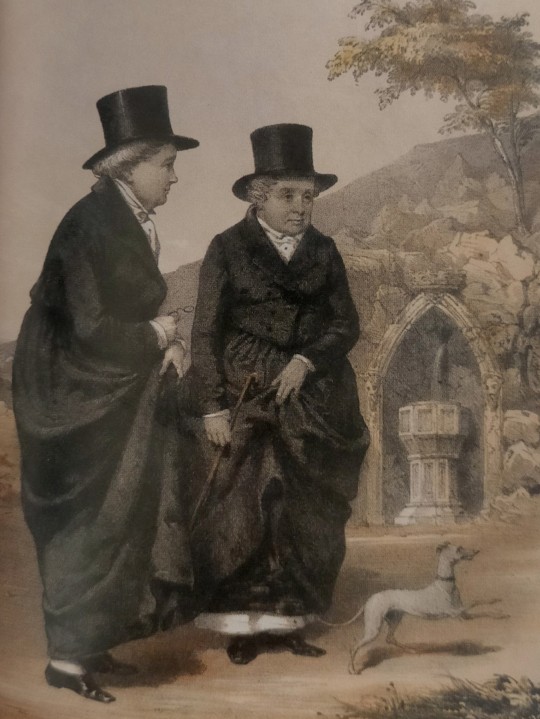
"Normal Women: 900 Years of Making History" - Philippa Gregory
#book quotes#normal women#philippa gregory#nonfiction#ladies of llangollen#slander#odd couple#menswear#fit check#james henry lynch#mary parker#secrets#inseparable friends#eleanor butler#sarah ponsonby#jacket#top hat#garden scene#mass production
1 note
·
View note
Text
This is like 600 words.
Everyone headcanons Ghost and Soap's living conditions like Ghost is a frequent visitor of r/malelivingspace and Soap has like a slightly cozy, filled just enough with furniture type of place. I think that's cute and hilarious, but I'm just thinking about the opposite.
That Ghost actually has this REALLY nice place somewhere near the base that Price *legally* finances for him but pays out of pocket for. King sized bed, some cacti, has an elderly neighbor that waters them for him if he's gone for too long and everything. I'm pretty sure Ghost was canonically a butcher (I hc him that way anyway) so he probably can make a good steak, and eventually learned how to cook for himself and it's become a hobby. He grew up without, so now that he has the money and the luxury to have a quiet space of his own, he takes full advantage of it.
I believe he likes stability, and while the base is where he feels the most like himself, the bustle of it all irritates him. Sometimes it's nice to drink your weird ass flavored tea with your pink cacti. Best date you'll ever have if you squint past the red flags Tom Cardy style.
And Soap? Pretty big, concrete, studio loft. Completely empty save necessary appliances and the fullest place being his art space with easels and canvases in front of the large windows, a cot with boxes of his shit next to it. And a bean bag chair begging for life. The only thing he knows how to cook is ramen and MRE tuna packets. He tries family recipes, but fucks it up so badly he hopes his nan doesn't see it beyond the grave. Growing up, he took care of himself while his parents worked constantly and could have been away for days at the time. It's easier to take care of yourself when your only obligations are feeding yourself, doing homework, and going to bed before midnight. Being an adult has similar rules but for some reason it's much worse.
Being in the military, it's an automatic rule to take care of yourself (physically). You stink, you'll get a bath one way or another. He doesn't buy anything because why need a bed if you'll only sleep on it for a month or so? Why a couch and TV when paying for a streaming service would be a waste? (Laptop disc player kind of guy, got a box of classic movies too, “THIS IS SPARTA!”) Really shouldn't even invest in a flat, he doesn't really celebrate holidays with his family anymore since they're the vacation on Christmas type. The only time he's there is when injured, forced or both.
But since Simon moves to Scotland and brings all his stuff with him, the big place gets filled a lot quicker. John gets some shelf racks and finally unpacks his boxes. I would say and maybe vice versa since Soap doesn't have a lot of stuff, but Price is glad to get that freeloader’s lease off his name.
Extra: They're all hanging out in the base’s living area.
Gaz: Does anybody need a couch? My sister's selling one, might even give it away if I ask.
Soap perks up from his spot on the floor: I do! I've been sleeping on the floor for 3 years!
Ghost: Johnny, I thought you said you had a cot?
Soap: I did. The legs broke, now it's just a framed mat.
Gaz: Bruv, what the fuck.
Soap: Does it have a stench?
Gaz: No?
Soap: I'll take it.
#ghostsoap#call of duty#drabble#totally not projecting#soap mactavish#simon ghost riley#i think i did this right#omg ghost with a little cactus with two pink flowers that look like eyes#gotta draw this now#kyle gaz garrick#shitpost#inncorrect quotes#john soap mactavish#Gerard Butler fan Soap#i think im funny#it's even called an old lady cactus#her name is Eleanor#the cactus and the woman
56 notes
·
View notes
Text
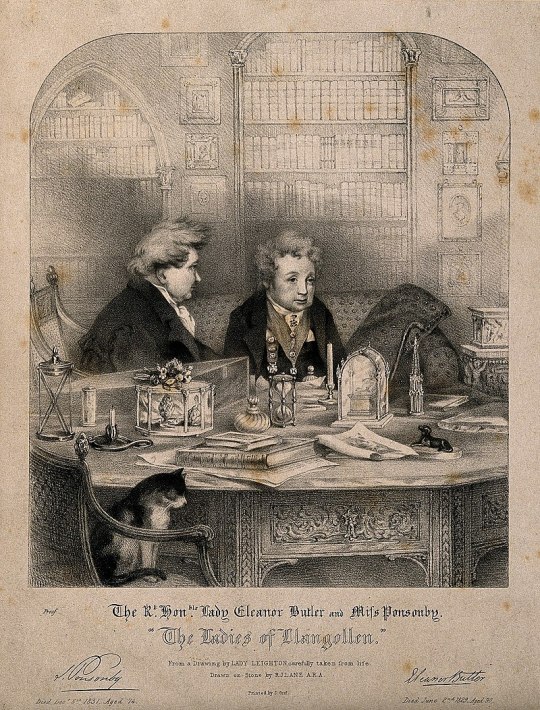
Sarah Ponsonby and Lady Eleanor Butler in their library (after 1831) by an unknown artist
3 notes
·
View notes
Text
rmr when louis was holding hands with that girl who looked like she could be his daughter
#last night i dreamt i was dating him . horror luv#everyone was coming for my throat LMAO all of tumblr was like 'this is so disrespectful from her towards eleanor' 😭😭😭😭😭😭😭#anyway he started morphing into different ppl soon after including austin butler and harry idk#and then there was a bit of narry so true
2 notes
·
View notes
Text
I just had a random thought.  I heard that it’s illegal to take pictures of celebrities in Paris, because they have  strict policies of privacy in Paris, and I’m talking about the Kia and Austin pictures that we supposedly got from yesterday.  But another thought was the celebs have to call or give permission to paparazzi to take pictures of them. But I do remember the controversy that happened with Eleanor and Louis Tomlinson from One Direction the whole Perez scandal if you remember that debacle if you’re part of that fandom but still I just find it very interesting but then again, just food for thought give me your opinion is down below.
4 notes
·
View notes
Photo
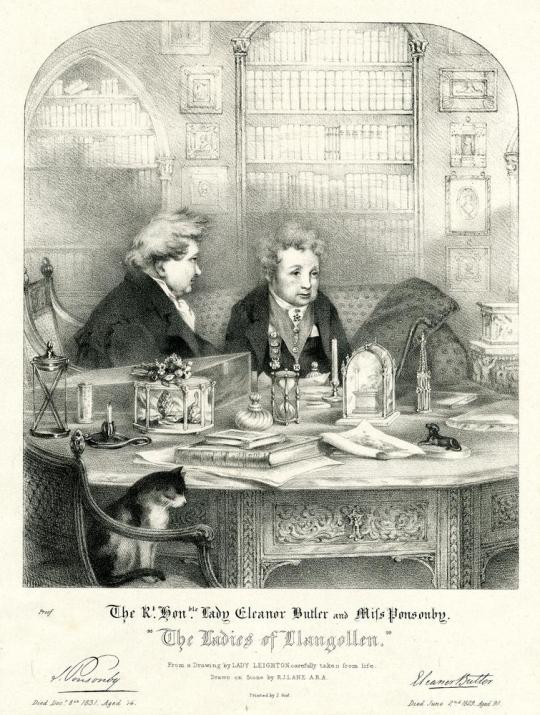
The Rt Honble Lady Eleanor Butler and Miss Ponsonby ‘The Ladies of Llangollen’, Richard James Lane, 19th Century
#The Rt Honble Lady Eleanor Butler and Miss Ponsonby ‘The Ladies of Llangollen’#the ladies of llangollen#Richard James lane#lane#19th century#1800s#print#art
13 notes
·
View notes
Text
An Abbey in Dublin Unearthed
Excavations in Dublin city centre have uncovered the remains of what was once one of Ireland’s most important medieval monasteries. St Mary’s was a House of Benedictines, followed by Savignac monks and then Cistercians, and it was exceedingly wealthy, with the added bonus of being permitted to claim goods from shipwrecks.
At times, it was quite a troubled place–the mayor of Dublin, Robert de…
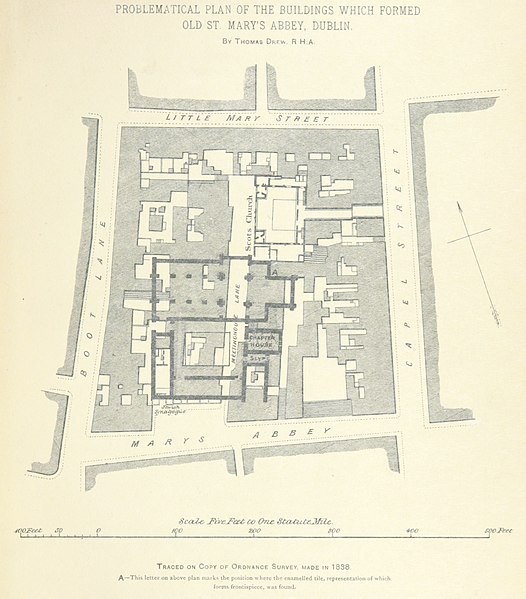
View On WordPress
#Archbishop of Dublin#bigamy#Dissolution of the Monasteries#Dublin#Earls of Ormond#Earls of Ulster#Earls of Wiltshire#Edward Bruce#Edward IV#executions#Henry VIII#Ireland#James Butler#John Earl of Shrewsbury#Lady Eleanor Talbot#Mael Sechnaill mac Maele Ruanaid#pre-contract#Richard Talbot#Robert de Nottingham#St. Mary&039;s Abbey#Towton#Walter Champfleur
0 notes
Text
youtube
#was elizabeth woodville married to edward iv?#history calling#lady eleanor butler#who was edward iv married to?#bigamous king?#fake queen?#Youtube
0 notes
Text
Her ears closed upon the sound of Eleanor's voice assuring her that once again they would manage their escape together, somehow: nothing, no one, would prevent them.
The Ladies, by Doris Grumbach
#page 202#the ladies#doris grumbach#the ladies of llangollen#lady eleanor charlotte butler#lady eleanor butler#eleanor butler#sarah ponsonby#Plas Newydd#queer lit#lgbtq+ lit#death#dying#love#quote#quotes#literature#book#booklr#reading
0 notes
Text
The Outlaws - Staffel 1 mit Christopher Walken auf DVD im Mai
Zur Serie “The Outlaws – Staffel 1” mit Christopher Walken erscheint am 26. Mai 2023 die DVD-Version. Die neue Serie stammt von „The Office“-Co-Creator Stephen Merchant.Christopher Walken wird am Freitag 80 Jahre alt und ist bekannt aus zahlreichen Filmen wie „James Bond – Im Angesicht des Todes“ und „Catch me if you can“. Eines seiner aktuellen Projekte heißt THE OUTLAWS, eine herrlich verrückte…

View On WordPress
#Alice im Wunderland#Big Talk Productions#Catch me if you can#Christopher Walken#Darren Boyd#Eleanor Tomlinson#Emma Jane Unsworth#Gamba Cole#James Bond – Im Angesicht des Todes#John Butler#Nikita Lalwani#Poldark#Polyband#Rhianne Barreto#Ricky Gervais#Stephen Merchant#The Office#The Outlaws#The Outlaws - Staffel 1
0 notes
Text
Murder in an Irish Castle (A Lady Eleanor Swift Mystery #12) by Verity Bright #NetGalley #eARCReview #CozyMystery #ChristmasMystery #NovemberBookRelease
It's time to read some holiday books and first up is a cozy mystery called Murder in an Irish Castle (A Lady Eleanor Swift Mystery #12) by Verity Bright #NetGalley #eARCReview #CozyMystery #ChristmasMystery #NovemberBookRelease #NewRelease #NewBooks
From Goodreads: “Christmas, 1924. Lady Eleanor Swift has received a rather unexpected invitation to the village Christmas party in the tiny, rural hamlet of Derrydee in the west of Ireland. Eleanor is thrilled about exploring her ancestral roots at her late uncle’s estate and spending the festive season in a castle. Packing Gladstone the bulldog’s coziest Christmas jumper, they set off to the…

View On WordPress
#Christmas#Christmas in Ireland#Clifford the Butler#Cozy Mystery#Derrydee#Eleanor Swift#Eleanor Swift Mystery#Gladstone the Bulldog#Ireland#Murder in an Irish Castle#Verity Bright
0 notes
Note
I am currently writing a story, and almost every character I’ve introduced so far uses she/her pronouns. I keep having to use their names over and over and it looks redundant and odd. I’ve used epithets a few times but I absolutely hate having to do that.
Is there any advice you have for this sort of issue, and if so, it would be great if you could share some! Thank you :)

Multiple Characters with the Same Pronouns
Having multiple characters with the same pronouns in one scene can make describing the scene a little difficult. I'm not sure if I have entirely new tips for you because you already pointed out the three most common ways to refer to a character (name, pronouns, epithets (a term used to characterise a person/thing)) and what the problems with each one can be. But I'll try my best :)
Repetition of Pronouns
First off, there is nothing wrong with using the character's pronouns a lot, as long as the reader can follow. A good thumb rule is that all fitting pronouns following the mention of a name (or an epithet) are referring to that mentioned character.
"Eleanor stormed out of the house. Her feet carried her aimlessly down the gravel path. She didn't care about the stares and she wouldn't slow down no matter what they would call after her. She had her mind made up."
This example is rather clear because there is not much back and forth between multiple characters with the same pronouns. It is very obvious that every 'she' and 'her' refers to the character named Eleanor. Now, if we have, let's say four characters in a scene that use she/her pronouns, we can still try to apply the same rule. Use an epithet or the name when the focus wanders from one character to the other. In between, when treating the same character, you can easily use their pronouns.
"Eleanor gritted her teeth. Why did she have to listen to her mother's long sermons? It wasn't fair. Everyone knew she had more important things to do. But now her mother's eyes bore even more accusingly into her.
'Do you think this is a joke, Eleanor?' Mother's voice flipped as she drew out the syllables of her daughter's name.
'Oh, leave her be, mother!' Ivy chimed in.
She was always ready to defend her elder sister. She was such a sweetheart, Eleanor thought.
Meredith, of course, had a different opinion.
'I don't know why Eleanor should get a different treatment than we. All she does is make trouble, and now there isn't even a consequence, or what?'
She wasn't hateful, she just had a very strong sense of justice. Too strong maybe, Eleanor thought. People were different enough; a good reason to treat them individually and not by some harsh standards that Meredith so liked to set."
I don't know if this is the best example but I hope it demonstrates a way to deal with the problem. Just as using pronouns a lot, it's also alright to repeat the characters' names quite a few times. It can help the reader 're-centre' in the story and be clear about which character is actually doing what.
Epithets
As to epithets, you don't have to use them excessively if you don't like it, but I feel it can be a great way to loosen up the story a bit here and there. As you said, with quick changes of focus between the characters, there is not much possibility to use the pronouns because we have to 'reintroduce' the characters whenever the focus of action changes. We don't always want to use their name for that. So? Epithets?
Maybe it helps to find the right epithets for your story. Maybe it doesn't feel cohesive to use attributes like 'the red-haired woman' or 'the grim-looking, old man'. Maybe it fits the story more to use the characters' roles like 'the teacher' or 'the butler'. I think when using the fitting epithets it can feel so coherent that you don't even notice them. E.g. Of course, character X is the driver, so we refer to them as the driver every now and then. Of course, character Y is the father of Z, so we can use epithets referring to their parental role. This, for example, can feel very natural, but what exactly feels natural is individual to every story/scene.
It can be one way to look for the epithets that are most natural to the character to not interrupt the flow of the story. Or it can be another way to look for the epithets that most set the character apart from the other characters to make a clear distinction of who exactly is acting right now. You can make this choice again and again with every new sentence. And of course, there are a lot more ways to categorise and choose epithets (I could maybe make another post about that if there is interest). But I hope this may already help a little :)
Let me know if you have more questions about this topic!

479 notes
·
View notes